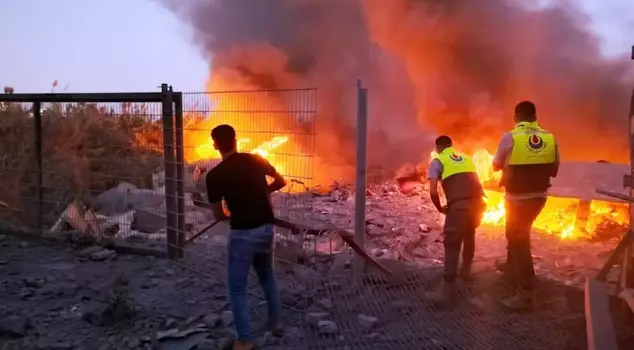
01.10.2024 11:52
The Israeli administration intensified its attacks after killing Hezbollah leader Hassan Nasrallah, without appointing a new leader for the organization. While continuing air bombardments, it also launched ground assaults. In an environment where tens of thousands of people have fled to Syria due to the conflicts, Israeli planes also targeted Syria. There are concerns that the clashes could lead to a new wave of migration towards Turkey.
The Israeli army has killed 41,615 people in its attacks on Gaza since October 8. Simultaneously targeting Lebanon, Israel has killed a total of 7 senior leaders, including organization leader Hassan Nasrallah, since that date. The death of Nasrallah, who has been the Secretary-General of the organization since 1992, has undoubtedly become the most significant turning point for Hezbollah. Nasrallah, known to have direct relations with Iranian leader Khamenei, has left a mark on Lebanon's last 30 years as both a political and military figure.
WHO WILL BE HEZBOLLAH'S NEW LEADER?
Following Nasrallah's assassination, there is curiosity about who will lead the organization, while Hezbollah denied reports that Haşim Safiyuddin, the head of the movement's executive council, has been elected to replace the late Secretary-General Hassan Nasrallah. However, it is unclear whether this denial was made to protect Safiyuddin from a possible attack or to cover up potential internal conflicts within the organization.
Another aspect that makes Safiyuddin significant for Hezbollah is that he manages the organization's investments worth billions of dollars in various regions of the world, including the Arab world, Africa, Europe, and Latin America. The U.S. had included Safiyuddin on its "terrorism" list in 2017 due to his significant role in the party and close ties with both military and executive branches.
Like his predecessor Nasrallah, Safiyuddin also has close ties to Iran, as well as an organic connection. His son Rıza married Zeynep Suleimani, the daughter of Iranian Revolutionary Guards leader Qassem Soleimani, in 2020.
NEW WAVE OF MIGRATION TO TURKEY POSSIBLE
While it is still difficult to predict how long the conflicts will last, Israel's attacks on refugee camps in Lebanon, and its bombing of Damascus, the capital of Syria, where Lebanese people are fleeing, have raised the possibility of a new wave of migration. The Iraqi Ministry of Migration and Displaced Persons announced that it has accepted 144 Lebanese citizens. Posts on social media emphasize that the people of Lebanon believe that Damascus is not safe for them and that Turkey is the only security factor in the region. One of the most important news organizations in the Middle East, Al-Monitor, also reported in a news article that one of the migration preferences of Lebanese fleeing the crisis is Turkey.
If the conflicts escalate, the Turkmen in Lebanon will likely try to flee to Turkey first. If the 1.5 million Syrian refugees in Lebanon are forced to migrate again, they will also cross into Syria, and those who cannot adapt to the Assad regime will also prefer Turkey first.
In a country where multi-sectarianism and religious identity have a strong influence on politics, Hezbollah has lost the support of the Christian party Free Patriotic Movement, which was one of its political allies until recently. In a country where different groups can form new alliances at any moment, Hezbollah is currently alone against Israel, at least militarily. The support of other small armed groups for the Hezbollah party is not considered sufficient against a force like Israel that has air power.
LEBANON'S ARMY IS WEAK AND DEPENDENT
The Lebanese National Army is far from being a cohesive and large force due to the country's economic crisis and political division. The military strength of the Lebanese army is weak, old, and largely dependent on the U.S. and other Western countries. Despite Hezbollah's military power giving the impression of a country within a country, there are also those who argue that Hezbollah's ability to remain strong against possible external interventions is due to the army's weakness in the streets of Lebanon.
OCCUPATION ON INDEPENDENCE ANNIVERSARY
Israel entered Lebanese territory in 1982 and occupied the country's south until 2000. Israel's ground invasion starting on October 1, the day Lebanon gained independence, was interpreted as significant. A large portion of the population in the country is in solidarity with those affected by the recent explosions of Hezbollah members' pagers and radios. Following a deadly mass attack that resulted in thousands of injuries, the majority blame Israel. Israel's airstrikes on southern Lebanon and the Bekaa Valley, and then on the crowded southern region of Beirut, strengthened this solidarity. A completely different process began with the ground attack.
ISRAEL FOSTERS DISSENSION
Israel has conducted an intense process to prevent the Lebanese people and state from opposing the occupation by fostering dissent regarding Hezbollah. When Israeli jets bombed Lebanon, Israeli Prime Minister Benjamin Netanyahu advised the Lebanese people not to oppose the occupation by stating, "Israel's war is not with you, but with Hezbollah."